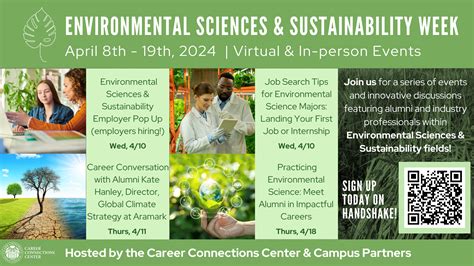Environmental science has emerged as a crucial field addressing the urgent challenges facing our planet. With a growing understanding of the interconnectedness of ecosystems and the impact of human activities on the environment, the demand for professionals in this sector has skyrocketed. Embarking on a career in environmental science offers a rich tapestry of opportunities to make a meaningful contribution to preserving and protecting our natural world.

Lucrative Career Paths in Environmental Science
According to the U.S. Bureau of Labor Statistics, the median annual salary for environmental scientists and specialists was $76,530 in May 2021. This figure reflects a promising career trajectory with substantial earning potential. Here are some of the most rewarding career paths within environmental science:
1. Sustainable Engineering
Sustainable engineers apply their technical expertise to design and implement solutions that minimize environmental impact. They work on projects ranging from renewable energy systems to efficient water management.
2. Environmental Consulting
Environmental consultants assist businesses and organizations in developing and implementing strategies to comply with environmental regulations and minimize their environmental footprint.
3. Water Resources Management
Water resources managers are responsible for ensuring the sustainable management of water supplies. They plan, design, and oversee projects to protect and restore water ecosystems.
4. Environmental Science Education
Environmental science educators play a vital role in inspiring future generations to understand and appreciate the environment. They develop and teach courses at various educational levels.
5. Conservation Biology
Conservation biologists focus on protecting and restoring endangered species and their habitats. They conduct research, design conservation plans, and work with communities to implement conservation measures.
Growing Demand for Environmental Professionals
The demand for environmental professionals is projected to continue to soar in the coming years. As awareness of environmental issues grows, businesses, governments, and non-profit organizations are increasingly seeking qualified professionals to help them meet their sustainability goals.
According to the UN Environment Programme, the global environmental goods and services market is estimated to reach $26 trillion by 2030. This growth is driven by increasing investments in renewable energy, energy efficiency, and waste management.
Generating Innovative Ideas for New Applications
The field of environmental science is ripe with opportunities for innovation and the development of cutting-edge solutions. Here are some potential areas where new applications could emerge:
1. Bioremediation
Bioremediation involves using microorganisms to clean up contaminated sites. Advancements in genetic engineering could lead to the development of more efficient and targeted bioremediation techniques.
2. Geospatial Data Analysis
Geospatial data analysis combines geographical information with other datasets to provide insights into environmental issues. Artificial intelligence could be utilized to automate and enhance data analysis, enabling more informed decision-making.
3. Citizen Science
Citizen science empowers the public to collect and share environmental data. Mobile applications could be developed to streamline data collection and improve data quality.
4. Climate Adaptation
Climate adaptation involves developing strategies to cope with the impacts of climate change. Advanced modeling techniques could be used to predict the effects of climate change and identify vulnerabilities.
Common Mistakes to Avoid in Environmental Science Careers
While pursuing a career in environmental science can be highly fulfilling, it is essential to avoid common pitfalls that can hinder progress:
1. Lack of Specialization
Environmental science is a broad field. Specializing in a particular area, such as renewable energy or water management, can increase your marketability and career growth potential.
2. Neglecting Communication Skills
Effective communication is crucial for conveying complex scientific information to a wide range of stakeholders. Develop strong written and verbal communication skills to succeed in presentations, reports, and interactions with colleagues.
3. Underestimating the Importance of Business Knowledge
In today’s competitive job market, environmental scientists also need to understand basic business principles. Knowledge of project management, financial analysis, and marketing can help you stand out from the crowd.
4. Under-Utilizing Networking
Networking is essential for career advancement in any field. Attend industry events, join professional organizations, and reach out to potential mentors to expand your professional circle.
FAQs about Environmental Science Careers
Q: What are the educational requirements for a career in environmental science?
A: Most entry-level positions in environmental science require a bachelor’s degree in environmental science, natural resources management, or a related field. Advanced degrees may be necessary for specialized roles.
Q: Can I make a difference in the environment as an environmental scientist?
A: Absolutely! Environmental scientists play a pivotal role in addressing environmental challenges and promoting sustainability. Your work can contribute to improving air and water quality, protecting ecosystems, and mitigating climate change.
Q: What are the job opportunities like in environmental science?
A: There is a growing demand for environmental scientists in various sectors, including government agencies, non-profit organizations, and private companies. The job market is projected to remain strong in the coming years.
Q: Can I pursue a career in environmental science even if my undergraduate degree is not in the field?
A: Many people transition into environmental science careers from other backgrounds. Consider pursuing a graduate degree in environmental science or obtaining relevant certifications to bridge the knowledge gap.
Q: What are the personal qualities of a successful environmental scientist?
A: Successful environmental scientists are passionate about the environment, have strong analytical and problem-solving skills, and are effective communicators. They also possess a commitment to teamwork and a desire to make a positive impact.
Q: How can I stay updated on the latest trends in environmental science?
A: Read industry publications, attend conferences, take continuing education courses, and engage with professional organizations to stay abreast of the latest advancements and best practices.
Conclusion
Embarking on a career in environmental science offers a unique opportunity to combine passion for the environment with meaningful work. With a projected surge in demand for qualified professionals, the future holds immense promise for those who are committed to protecting and preserving our planet. By embracing innovation, specializing in a particular area, and developing strong communication and business skills, you can forge a fulfilling and impactful career in this transformative field.
